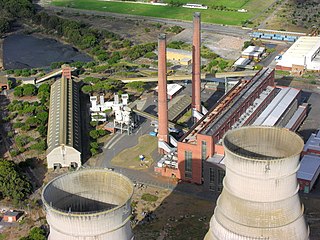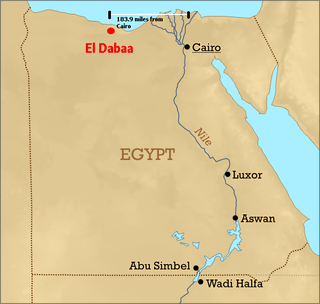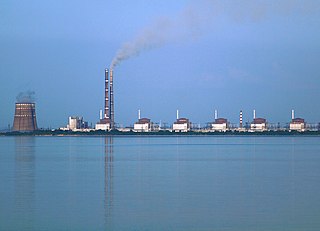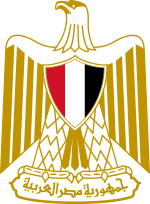
Hydropower, also known as water power, is the use of falling or fast-running water to produce electricity or to power machines. This is achieved by converting the gravitational potential or kinetic energy of a water source to produce power. Hydropower is a method of sustainable energy production. Hydropower is now used principally for hydroelectric power generation, and is also applied as one half of an energy storage system known as pumped-storage hydroelectricity.

A power station, also referred to as a power plant and sometimes generating station or generating plant, is an industrial facility for the generation of electric power. Power stations are generally connected to an electrical grid.

India is the third largest producer of electricity in the world. During the fiscal year (FY) 2022–23, the total electricity generation in the country was 1,844 TWh, of which 1,618 TWh was generated by utilities.

The water-water energetic reactor (WWER), or VVER is a series of pressurized water reactor designs originally developed in the Soviet Union, and now Russia, by OKB Gidropress. The idea of such a reactor was proposed at the Kurchatov Institute by Savely Moiseevich Feinberg. VVER were originally developed before the 1970s, and have been continually updated. As a result, the name VVER is associated with a wide variety of reactor designs spanning from generation I reactors to modern generation III+ reactor designs. Power output ranges from 70 to 1300 MWe, with designs of up to 1700 MWe in development. The first prototype VVER-210 was built at the Novovoronezh Nuclear Power Plant.

In 2022, 79.6% of Taiwan's electricity generation came from fossil fuels, 9.1% from nuclear, 8.6% from renewables, and 1.2% from hydro. Taiwan relies on imports for almost 98% of its energy, which leaves the island's energy supply vulnerable to external disruption. In order to reduce this dependence, the Ministry of Economic Affairs' Bureau of Energy has been actively promoting energy research at several universities since the 1990s.

The Electricity Generating Authority of Thailand (EGAT) is a state enterprise, managed by the Ministry of Energy, responsible for electric power generation and transmission as well as bulk electric energy sales in Thailand. EGAT, established on 1 May 1969, is the largest power producer in Thailand, owning and operating power plants at 45 sites across the country with a total installed capacity of 15,548 MW.
Oglethorpe Power Corporation is a medium-sized electric utility in Georgia, United States. Formed in 1974, Oglethorpe is a not-for-profit cooperative owned by the 38 electric membership corporations that it serves. The utility's headquarters are in Tucker, Georgia.

Energy laws govern the use and taxation of energy, both renewable and non-renewable. These laws are the primary authorities related to energy. In contrast, energy policy refers to the policy and politics of energy.

Energy in Finland describes energy and electricity production, consumption and import in Finland. Energy policy of Finland describes the politics of Finland related to energy. Electricity sector in Finland is the main article regarding electricity in Finland.

Energy in Armenia is mostly from natural gas. Armenia has no proven reserves of oil or natural gas and currently imports most of its gas from Russia. The Iran-Armenia Natural Gas Pipeline has the capacity to equal imports from Russia.

The Ministry of Energy and Mineral Development, also Ministry of Energy, Oil and Mineral Development is one of the governmental bodies of Uganda. The ministry has the function of developing and implementing policies related to electricity, minerals, petroleum and petroleum products. The ministry is part of the national cabinet and is headed by a cabinet minister. The current Cabinet Minister of Energy is [Hon. Ruth Ssentamu Nankabirwa].
President Adly Mansour announced on 7 November 2013 that Egypt was restarting its nuclear power program in El Dabaa; a deal was reached with the residents in which it was agreed that a residential area will also be built. The Egyptian minister of electricity, Ahmed Emam, has called the project "necessary" because of a small amount of renewable energy sources and not enough fuel.

This article describes the energy and electricity production, consumption and import in Egypt.

El Dabaa is a town in the Matrouh Governorate, Egypt. It lies 296 kilometres (184 mi) from Cairo on the north coast and is served by the El Alamain International Airport. It is famous for the Russian technology nuclear power plant being constructed to the north east of the city boundaries.
National nuclear energy policy is a national policy concerning some or all aspects of nuclear energy, such as mining for nuclear fuel, extraction and processing of nuclear fuel from the ore, generating electricity by nuclear power, enriching and storing spent nuclear fuel and nuclear fuel reprocessing. Nuclear energy policies often include the regulation of energy use and standards relating to the nuclear fuel cycle.

Energy in Ukraine is mainly from gas and coal, followed by nuclear and oil. The coal industry has been disrupted by conflict. Most gas and oil is imported, but since 2015 energy policy has prioritised diversifying energy supply.
In the late 1970s, President Anwar Sadat initiated neoliberal policies in Egypt. Following Sadat's assassination in 1981, President Hosni Mubarak came to power and continued the economic liberalization of Egypt.
El Dabaa Nuclear Power Plant is the first nuclear power plant planned for Egypt and will be located at El Dabaa, Matrouh Governorate, Egypt, about 320 kilometers northwest of Cairo. The plant will have four VVER-1200 reactors, making Egypt the only country in the region to have a Generation III+ reactor.

EuroAfrica Interconnector is a planned HVDC interconnector and submarine power cable between the Greek, Cypriot, and Egypt power grids. The Interconnector is an energy highway bridging Africa and Europe. It will have a capacity to transmit 2,000 megawatts of electricity in either direction. Annual transmission capacity will be rated at 17.5 TWh, much more than the annual production at the Aswan Dam power stations. President of Egypt Abdel Fattah el-Sisi, President of Cyprus Nicos Anastasiades and Prime Minister of Greece Kyriakos Mitsotakis, issued a joint declaration at the conclusion of the 7th Trilateral Summit, held in Cairo on October 8, 2019, in which they expressed their desire to continue strengthening their cooperation in matters of energy. In particular, the joint declaration by the three leaders stated they recognised the importance of establishing an electrical grid between Egypt, Cyprus and Greece, building on the framework agreement between the Egyptian Electricity Holding Company and the Euro Africa Interconnector Company on 22 May 2019.
NPPA: is an Egyptian public economic authority of a special nature, affiliated to the Ministry of Electricity and Renewable Energy
















